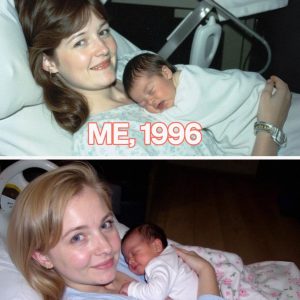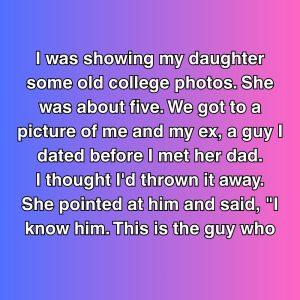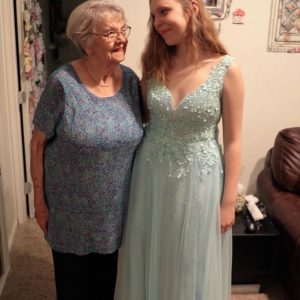A grocery run was supposed to be quick and uneventful.
My daughter, Miri, and Max, her service dog-in-training, walked ahead of me. She takes her training job seriously—vest on, leash steady, eyes always scanning. At twelve, she’s calmer and more attentive than many adults I’ve seen in public spaces.
I was halfway down the dairy aisle, grabbing milk, when I heard shouting.
By the time I rounded the corner, I saw it:
A woman in yoga pants was red-faced, pointing at Miri as if my little girl had toppled an entire display.
“You can’t bring a dog in here unless you’re blind!” she shrieked. “Where’s your mom? You’re not watching him! This is why kids shouldn’t be alone!”
Miri just stood there, cheeks flushed. She doesn’t usually cry when she’s scared, but I know my daughter—she was shaken to her core. And yet, Max was perfect. He stayed in a calm down-stay right beside her, steady and protective, not moving an inch despite the chaos.
The woman delivered her final blow with venom:
“Take your mutt and get out!”
Miri, my brave, big-hearted child, didn’t shout back. She simply turned and left.
By the time I got there, she was sitting outside on a bench, holding back tears, trying to disappear into herself.
That was the moment I promised myself: this wasn’t going to end there.
I found the manager. Calm but firm, I explained everything.
A nearby cashier chimed in:
“Yeah, that lady’s in here all the time. Always causing drama.”
The manager promised to review the footage.
Two days later, I had the video in my hands.
Five days later, I uploaded it.
The raw, unedited clip of a composed child being berated by a grown woman spread like wildfire. Within hours, it was everywhere.
I thought it would fade like most viral moments, until a comment stopped me cold:
“Is that Leslie from yoga class?”
Replies piled up.
People debated, shared screenshots from a “Mindful Mamas of Greater Seattle” Facebook post.
The same woman from the video had posted her own version, claiming she was “verbally attacked by a kid pretending to need a service dog.”
Her attempt to twist the story didn’t last. The group’s admin later issued a public apology:
“After reviewing the viral footage, we cannot support the bullying of children—especially those accompanied by service animals.”
But it was too late.
Her name spread.
Her job surfaced—she taught meditation and breathwork at a boutique wellness studio.
Then came the flood of stories:
“Leslie kicked my autistic nephew out of her class two years ago. Said his ‘energy was too disruptive.’”
“She humiliated me at Whole Foods for buying soda with my EBT card. Told me I was ‘poisoning my kids.’”
People started connecting dots I never knew existed.
Through it all, I stayed silent. I didn’t speak publicly. I didn’t fan the flames.
I thought it was over until, one Saturday, a soft-spoken woman approached Miri and me at the park.
Short gray hair, gentle smile, voice shaking as she knelt to pat Max:
“I just wanted to say… I saw what happened. That’s Leslie—she’s my sister. I’m so sorry.”
She wasn’t defensive. She didn’t make excuses.
She simply said:
“Leslie has battled so much—control, anger—but nothing excuses what she said to your daughter. I raised kids with disabilities. Watching that video broke my heart.”
We talked for a long time. She asked if she could pass on a message of kindness to Leslie someday. I agreed.
Two days later, an email arrived.
From Leslie.
It wasn’t public. It wasn’t defensive.
It wasn’t angry.
She wrote:
“I know I can’t undo what I did. After seeing the video, I hate myself. I snapped because I was triggered—not your fault. Last year, I miscarried. I wanted a daughter. Seeing a girl that age hurts. I made your child feel small to feel powerful. I realize how broken I am. If I can send Miri an apology letter, please let me know.”
I sat with it for hours. Then I showed it to Miri.
Her response surprised me:
“I want her to write it. I want to know her anger. Maybe it’ll stop her from yelling at other kids.”
So Leslie wrote.
Miri read it.
She never wrote back, but she drew a picture of Max and mailed it to Leslie’s return address.
Life settled again.
But a month later, something unexpected arrived in the mail.
A letter from the wellness studio where Leslie used to work.
They had seen the viral video. They’d severed ties with Leslie.
And they wanted to offer Miri a scholarship to their new Calm Kids mindfulness program—run by a different teacher with experience supporting neurodiverse and anxious children.
Miri’s face lit up. She didn’t hesitate to join.
Her first session was magical.
While Max curled up in a quiet corner, Miri and other children practiced breathing with colorful pinwheels, learned calm hand motions, and shared stories of feeling out of place.
For the first time in years, I saw my daughter relaxed in public.
The studio later invited us to speak at their annual inclusivity and accessibility event.
Miri spent weeks practicing her speech.
That day, standing in front of 200 adults, she said:
“Sometimes adults yell at kids because they don’t understand. But if they listened, maybe we wouldn’t feel so scared.”
There wasn’t a dry eye in the room.
The ripple effects didn’t stop there.
Jean, who runs a local service dog training organization, saw the video too.
“We’ve never seen a dog-in-training stay this composed in public chaos,”
she told me.
Max was certified early.
Jean announced their next service dog would be named “Miri,” in honor of my daughter’s bravery.
And then came a surprise in the mail.
A small, self-published children’s book.
Title: The Girl with the Brave Dog.
Written by Leslie.
A heartfelt story about remorse, growth, and second chances.
On the dedication page, just one line:
“Miri taught me what real calm feels like.”
I didn’t expect to feel anything reading it.
But I cried.
Not for Leslie.
For every child ever humiliated by an adult who refused to understand.
For every brave kid like Miri who held their head high when it was easier to run.
For every parent who found the strength to transform anger into something better.
We still shop at that grocery store.
Cashiers now smile and wave, always asking about Max.
Last week, one slipped Miri a handmade bracelet.
“She reminds me of my niece,”
he said.
We never sought revenge.
We just wanted honesty.
And because of that, things changed—not just for us, but for others too.
Yes, a stranger shouted at my daughter in public.
But instead of punishment or exile, she was given a mirror.
And sometimes…
that’s the most powerful justice there is.





